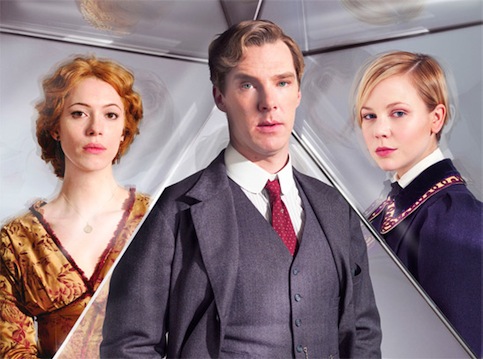HBO's Parade's End a downer for Downton Abbey devotees
02/26/13 01:47 PM

By ED BARK
@unclebarkycom
Far be it from HBO to follow the leads of others. Except this once -- for now.
The premium pay network would like a little of that Downton Abbey action. It also wants to experiment, on a smaller scale, with the watch-it-all-at-once-if-you-want stratagem of Netflix and its first original series, House of Cards.
Those two paths cross with Parade's End, a British saga set in the World War I era. Otherwise known as "a time of unprecedented change, when old certainties were being torn down" says HBO's publicity release. Sound familiar?
HBO also is making the five-hour miniseries available in one big gulp on its streaming service, HBO GO. Both the network and its website launch Parade's End on Tuesday, Feb. 26th. On conventional TV screens, the first two parts air from 8 to 10:05 p.m. (central) on that night with parts three and four on Wednesday (8 to 10:05 p.m.) and part five on Thursday (8 to 9 p.m.)
All five parts are ready to roll instantly on HBO GO. And the network's On Demand service also will have all of the episodes up at once, but not until Wednesday, Feb. 27th.
OK, that's a lot to process. But is Parade's End any good? In fits and spurts, yes. But overall, this is a pale facsimile of Downton Abbey, complete with more military uniforms and fewer sumptuous dinners. Part 4 in particular is a slog.
The story pivots on a triangle, with unrequited love dangling like an elusive fourth Super Bowl appearance by the Jerry Jones-owned Dallas Cowboys.
Benedict Cumberbatch, best known as the devil-may-care star of the BBC/PBS Sherlock series, plays British aristocrat Christopher Tietjens. He's an exceedingly honorable bloke whose unfaithful wife Sylvia (Rebecca Hall) is so bored by him that she'd "rather be a cow in a field." Still, she admires his knowledge about seemingly everything -- save for knowing how to have a good time.
Christopher clings steadfastly to the conservative Tory ways, which basically are a steadfast commitment to tradition, principle and unwavering loyalty. But his head is turned -- very much against his will -- by a spunky young suffragette named Valentine Wannop (Adelaide Clemens). Their mutual attraction to one another cannot be consummated, though. That is, unless Christopher finally finds a way to free himself from the shackles of his unyielding psyche.
It's something of a Prince Charles-Camilla Parker Bowles love story, except that Valentine is much younger (and often looking like a schoolgirl) while Princess Diana presumably wasn't anywhere near the bitch that Sylvia is.
Cumberbatch plays Christopher for a decade's span (1908-'18), growing convincingly more haggard and war-wear by the year. Although stoic to a fault, the character regularly breaks into a lip tremble or full-out weep. Those who have lampooned Claire Danes' "cry face" as Carrie Mathison in Homeland may have a new target in Cumberbatch's Christopher. In short, he's got a lot of John Boehner in him, and not always to good effect.
Hall's Sylvia, whose son may or may not be by Christopher, is aggressively amoral for her times. But she's capable of seeing herself in the mirror and remarking, "Of course he (Christopher) wants to make me suffer. What man wouldn't?" Sylvia mainly wants to get a rise out of her husband, who's way too stiff and proper for that. Although she's both devious and haughty, a viewer's sympathy might well tilt to her side a few times.
Meanwhile, Valentine pines away, yearning to be Christopher's unconditional mistress if he won't leave his wife. Their lips almost meet during Tuesday's first hour -- in a stagey scene in a foggy meadow. But soon he's off to war -- twice.
Parade's End has a number of supporting characters breezing in and out. Some might recognize Stephen Graham as Christopher's main confidante, Vincent Macmaster. He otherwise plays Al Capone on HBO's Boardwalk Empire.
Rupert Everett also co-stars, but makes little impression as Christopher's bearded older brother, Mark. Veteran actress Miranda Richardson has more of an impact as Valentine's nurturing mother, who's a writer.
It's all drawn from the novels of Ford Madox Ford, and written for the screen by Oscar-winner Tom Stoppard (Shakespeare In Love). But although affecting at times, Parade's End tends to congeal rather than gel. It's no match at all for Downtown Abbey and its vivid collection of haves and have-nots.
The central, overriding question -- will do-right dud Christopher ever loosen up and succumb to true happiness? -- will be answered in the end. But too often I couldn't wait for the end to come. Not because Parade's End had me in its grips. But because I'd made the damned investment to see this to the end. Alas, it was the only honorable thing to do before writing this review.
GRADE C+
unclebarky@verizon.net
